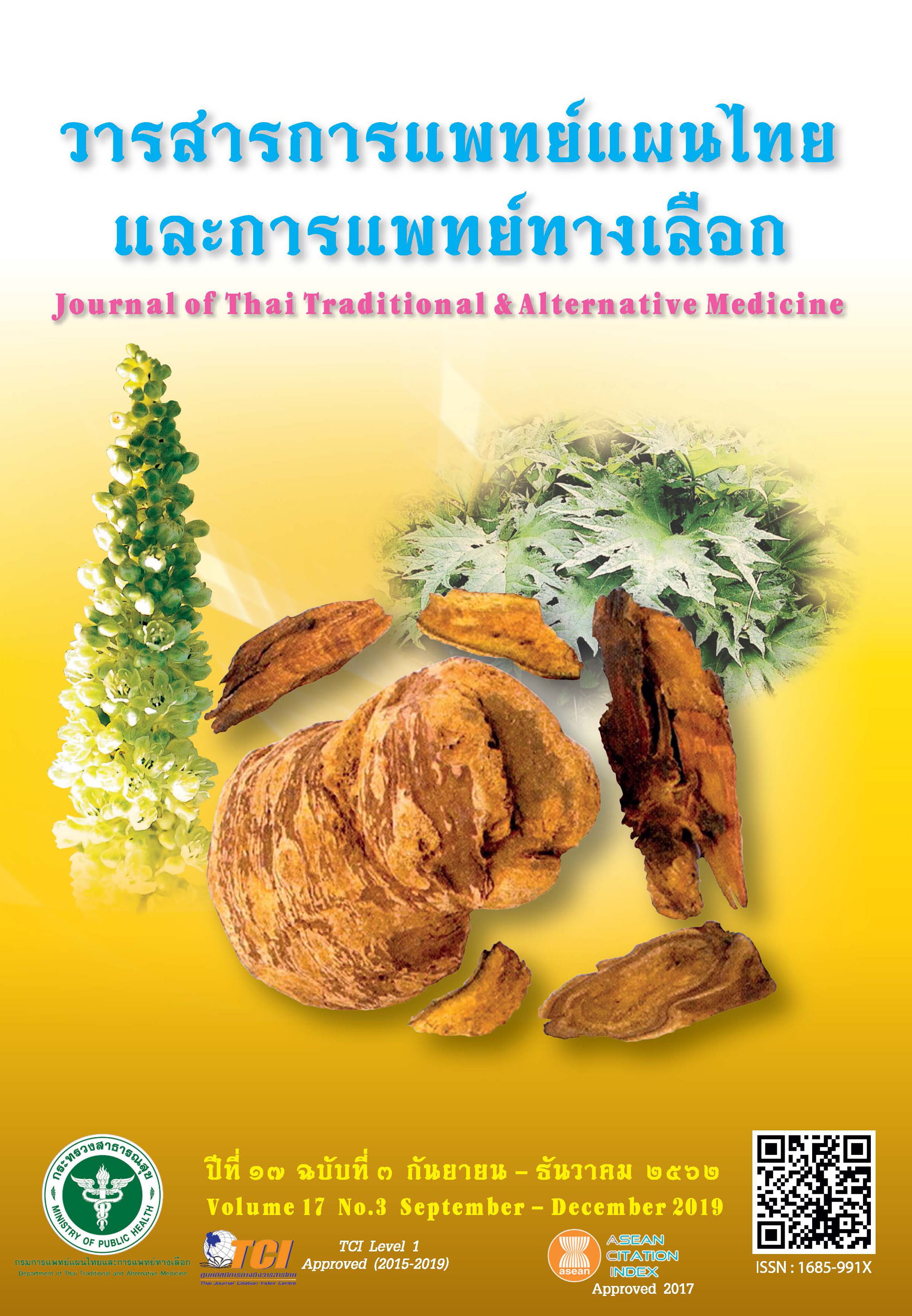Effect of Project Based Learning Program on Problem Solving Skills and the Application of Local Wisdom for Patients with NCDs in Community
Main Article Content
Abstract
The quasi-experimental research with one group pretest-posttest aimed to compare the results of problemsolving skills and the application of local wisdom to take care of patients with NCDs prior to and after the experiment, which was conducted from September 2017–January 2018. The population group was 56 senior nursing students. They were then separated into 7 groups, 8 students each before being educated in a project based learning program which composed of 2 phases including 1) Theory learning in evidence-based searching and analysis and 2) Applying findings for providing healthcare services in 7 fieldwork practices. The data was analyzed by descriptive statistics and dependent t-test method. The research yielded the following results: in the first phase, the students learned the local wisdoms from searching and analyzing (1) prayer with beads and meditation (2) bamboo and coconut-shell foot massages 3) long stick exercises (4) Ruesi Dadton knee exercises (5) herbal compresses and (6) elastic band exercises. The second phase found that the problem solving skills of the sample group was greater after attending the program with statistical significance (p < 0.01). The senior nursing students could apply local wisdom to take care patients with NCDs. The stick exercise was applied to patients with high blood pressure from 2 communities; the bamboo and coconut-shell foot massage, and hot herbal pool to patients with diabetes from 2 communities; prayer with beads and meditation to patients with diabetes from 1 community; elastic band exercise to patients from 1 community; Ruesi Dadton knee exercise and herbal compress to elderly with knee osteoarthritis from 1 community, and revealed that the patients who participated in every project had scores of knowledge and skills of behaviors in each activity passing the evaluation criteria. Nursing instructors and the public can apply the results in designing learning activities for nursing students in the future.
Article Details
References
2. Uantrai P, Tunsriwong S, Akatimagool S. The development of DAPOA project-based learning model for industrial technology education. The 8th national conference on technical education; 2015 Nov 26; Bangkok. 2015. (in Thai)
3. Srichantha S. Project based learning in instructional methodology and management in mathematics 1 course for bachelor’s degree students of the faculty of education in mathematics at Loei Rajabhat University. Journal of MCU Social Science. 2017;6(1):127-39. (in Thai)
4. Sa-nguansaj S, Surin-arbhorn M, Tangwongkit T, Jadpum J, Kerdmuang S. Satisfaction of the quality and identity of graduated nurses, Boromrajonani College of Nursing Chainat in academic year 2015. Chandrakasem Rajabhat University. Journal of Graduate School. 2019;14(2):81-90. (in Thai)
5. Sittiwong T, Wongnam T. Studying of 5-step learning process (QSCCS) for master’s degree students in educational technology and communications program, Faculty of Education, Naresuan University. Journal of Education Naresuan University. 2016;8(4):86-98. (in Thai)
6. Nochit W. Course report of family and community nursing II subject for academic year 2015 of Boromarajonani College of Nursing, Chainat. Chainat: Boromarajonani College of Nursing, Chainat; 2015. (in Thai)
7. Duffy TM, Cunningham D.J. Constructivism: Implications for the design and delivery of instruction. In: Jonassen DH, editor. Handbook of research for educational communications and technology. NY: Macmillan Library Reference USA; 1996.
8. Bednar AK, Cunningham D, Duffy T.M, Perry J.D. Theory into practice: How do we link? In: Jonassen DH, Duffy TM, editors. Constructivism and the technology of instruction: A conversation. New Jersey: Lawrence Erlbaum Associates; 1992. p. 17-35.
9. Thummakul D, Thunjareanrat W, Lapjeam P. Effects of project-based learning on learning development of nursing students. Journal of health science research. 2014;8(1):46-54. (in Thai)
10. Art-in S, Netthanomsak T. Project based learning in curriculum development course for five-year bachelor’s degree students. KKU Research Journal. 2011;1(1):1-16. (in Thai)
11. Poorananon P, Krirkgulthorn T. The ability and attitudes toward evidence-based nursing of nursing Students. Journal of Nursing Science. 2011;29(1):46-55. (in Thai)
12. Thato R. Nursing research: concepts to application. Bangkok: Faculty of Nursing Chulalongkorn University; 2018. (in Thai)
13. DeVellis RF. Scale development. Singapore: SAGE Publications; 2012.
14. Insa-ard S. Project based learning in games and simulation course for education for undergraduate students. Bangkok: Educational technology department, Ramkhamhaeng University; 2012. (in Thai)
15. Panyain T, Teerachat T, Kornatipong T. Music theory learning process management using project based learning to improve lifelong learning skills. Academic Journal of Buriram Rajabhat University. 2017;9(2):131-42. (in Thai)


